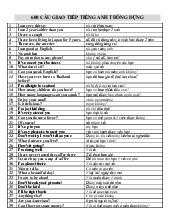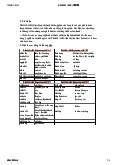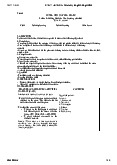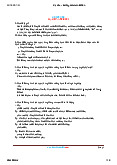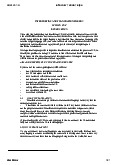



Preview text:
20:26 29/7/24
Ielts Striking NOTE Ielts Reading Passage 2- Ielts PLUS
Section 1 dạng tóm tắt
Read the Passage to Answer the Following Questions
Striking the Right Note Reading Answers
Is perfect pitch a rare talent possessed solely by the likes of Beethoven? Kathryn Brown
discusses this much sought-after musical ability.
A. The uncanny, if sometimes distracting, ability to name a solitary note out of the
blue, without any other notes for reference, is a prized musical talent - and a
scientific mystery. Musicians with perfect pitch - or, as many researchers prefer
to call it, absolute pitch - can often play pieces by ear, and many can transcribe
music brilliantly. That’s because they perceive the position of a note in the
musical stave - its pitch - as clearly as the fact that they heard it. Hearing and
naming the pitch go hand in hand.
=> câu 1 năm ở dòng 1, 2,3
Dạng từ điền danh từ (tính từ: musical + danh từ) Mysterious -mystery Perfect pich = perfect pitch
Name and sing a note = name the higher note
Without reference to another, separate them = recognize two note apart = phân bietj, nói sự khác, tách rời.
Genetic, inheritance, early exposure to = genes, early music lessions Perfect pithc = adsolute pitch Recite = recited
On different occation = different days
Playing by ear = playing by ear
Asian => asian families , many = many
B. By contrast, most musicians follow not the notes, but the relationship between
them. They may easily recognise two notes as being a certain number of tones
apart, but could name the higher note as an E only if they are told the lower one
is a C, for example. This is relative pitch. Useful, but much less mysterious. about:blank 1/4 20:26 29/7/24
Ielts Striking NOTE Ielts Reading Passage 2- Ielts PLUS
C. For centuries, absolute pitch has been thought of as the preserve of the musical
elite. Some estimates suggest that maybe fewer than 1 in 2,000 people possess
it. But a growing number of studies, from speech experiments to brain scans, are
now suggesting that a knack for absolute pitch may be far more common, and
more varied, than previously thought. ‘Absolute pitch is not an all or nothing
feature,’ says Marvin, a music theorist at the University of Rochester in New York
state. Some researchers even claim that we could all develop the skill,
regardless of our musical talent. And their work may finally settle a decades-old
debate about whether absolute pitch depends on melodious genes - or early music lessons.
D. Music psychologist Diana Deutsch at the University of California in San Diego is
the leading voice. Last month at the Acoustical Society of America meeting in
Columbus, Ohio, Deutsch reported a study that suggests we all have the
potential to acquire absolute pitch - and that speakers of tone languages use it
every day. A third of the world’s population - chiefly people in Asia and Africa -
speak tone languages, in which a word’s meaning can vary depending on the pitch a speaker uses.
E. Deutsch and her colleagues asked seven native Vietnamese speakers and 15
native Mandarin speakers to read out lists of words on different days. The chosen
words spanned a range of pitches, to force the speakers to raise and lower their
voices considerably. By recording these recited lists and taking the average pitch
for each whole word, the researchers compared the pitches used by each person
to say each word on different days.
F. Both groups showed strikingly consistent pitch for any given word - often less
than a quarter-tone difference between days. ‘The similarity,’ Deutsch says, ‘is
mind-boggling.’ It’s also, she says, a real example of absolute pitch. As babies,
the speakers learnt to associate certain pitches with meaningful words - just as a
musician labels one tone A and another B - and they demonstrate this precise
use of pitch regardless of whether or not they have had any musical training, she adds.
G. Deutsch isn’t the only researcher turning up everyday evidence of absolute pitch.
At least three other experiments have found that people can launch into familiar
songs at or very near the correct pitches. Some researchers have nicknamed this
ability ‘absolute memory’, and they say it pops up on other senses, too. Given
studies like these, the real mystery is why we don’t all have absolute pitch, says
cognitive psychologist Daniel Levitin of McGill University in Montreal.
H. Over the past decade, researchers have confirmed that absolute pitch often runs
in families. Nelson Freimer of the University of California in San Francisco, for
example, is just completing a study that he says strongly suggests the right
genes help create this brand of musical genius. Freimer gave tone tests to
people with absolute pitch and to their relatives. He also tested several hundred
other people who had taken early music lessons. He found that relatives of
people with absolute pitch were far more likely to develop the skill than people
who simply had the music lessons. There is clearly a familial aggregation of
absolute pitch,’ Freimer says. about:blank 2/4 20:26 29/7/24
Ielts Striking NOTE Ielts Reading Passage 2- Ielts PLUS
I. Freimer says some children are probably genetically predisposed toward
absolute pitch - and this innate inclination blossoms during childhood music
lessons. Indeed, many researchers now point to this harmony of nature and
nurture to explain why musicians with absolute pitch show different levels of their talent.
J. Indeed, researchers are finding more and more evidence suggesting music
lessons are critical to the development of absolute pitch. In a survey of 2,700
students in American music conservatories and college programmes, New York
University geneticist Peter Gregersen and his colleagues found that a whopping
32 per cent of the Asian students reported having absolute pitch, compared with
just 7 per cent of non-Asian students. While that might suggest a genetic
tendency towards absolute pitch in the Asian population, Gregersen says that the
type and timing of music lessons probably explains much of the difference.
K. For one thing, those with absolute pitch started lessons, on average, when they
were five years old, while those without absolute pitch started around the age of
eight. Moreover, adds Gregersen, the type of music lessons favoured in Asia,
and by many of the Asian families in his study, such as the Suzuki method, often
focus on playing by ear and learning the names of musical notes, while those
more commonly used in the US tend to emphasise learning scales in a relative
pitch way. In Japanese pre-school music programmes, he says, children often
have to listen to notes played on a piano and hold up a coloured flag to signal the
pitch. ‘There’s a distinct cultural difference,’ he says.
L. Deutsch predicts that further studies will reveal absolute pitch - in its imperfect,
latent form - inside all of us. The Western emphasis on relative pitch simply
obscures it, she contends. ‘It’s very likely that scientists will end up concluding
that we’re all born with the potential to acquire very fine-grained absolute pitch.
It’s really just a matter of life getting in the way.’
Từ đồng nghĩa, sát nghĩa, trùng nghĩa: - Mysterious múical - perfect pitch - Name sing a Section 2 Solution and Explanation Questions 1-8:
Complete the notes below using words from the box.
Write your answers in boxes 1-8 on your answer sheet.
Research is being conducted into the mysterious musical 1__________ some people
possess known as perfect pitch. Musicians with this talent are able to name and sing a about:blank 3/4 20:26 29/7/24
Ielts Striking NOTE Ielts Reading Passage 2- Ielts PLUS
2__________without reference to another and it is this that separates them from the
majority who have only 3___________pitch. The research aims to find out whether this
skill is the product of genetic inheritance or early exposure to 4________or, as some
researchers believe, a combination of both. One research team sought a link between
perfect pitch and 5________languages in order to explain the high number of Asian
speakers with perfect pitch. Speakers of Vietnamese and Mandarin were asked to recite
6__________on different occasions and the results were then compared in terms of
7_________separate study found that the approach to teaching music in many Asian
8__________emphasised playing by ear whereas the US method was based on the relative pitch approach. Mysterious -mystery Perfect pich = perfect pitch
Name and sing a note = name the higher note
Without reference to another, separate them = 1. Talent/ability 2. Note 3. Relative (tương đối) 4. Music lessons 5. Tone languages
6. Words/lits of words/each word 7. Pitch 8. Families In term of xét về about:blank 4/4
